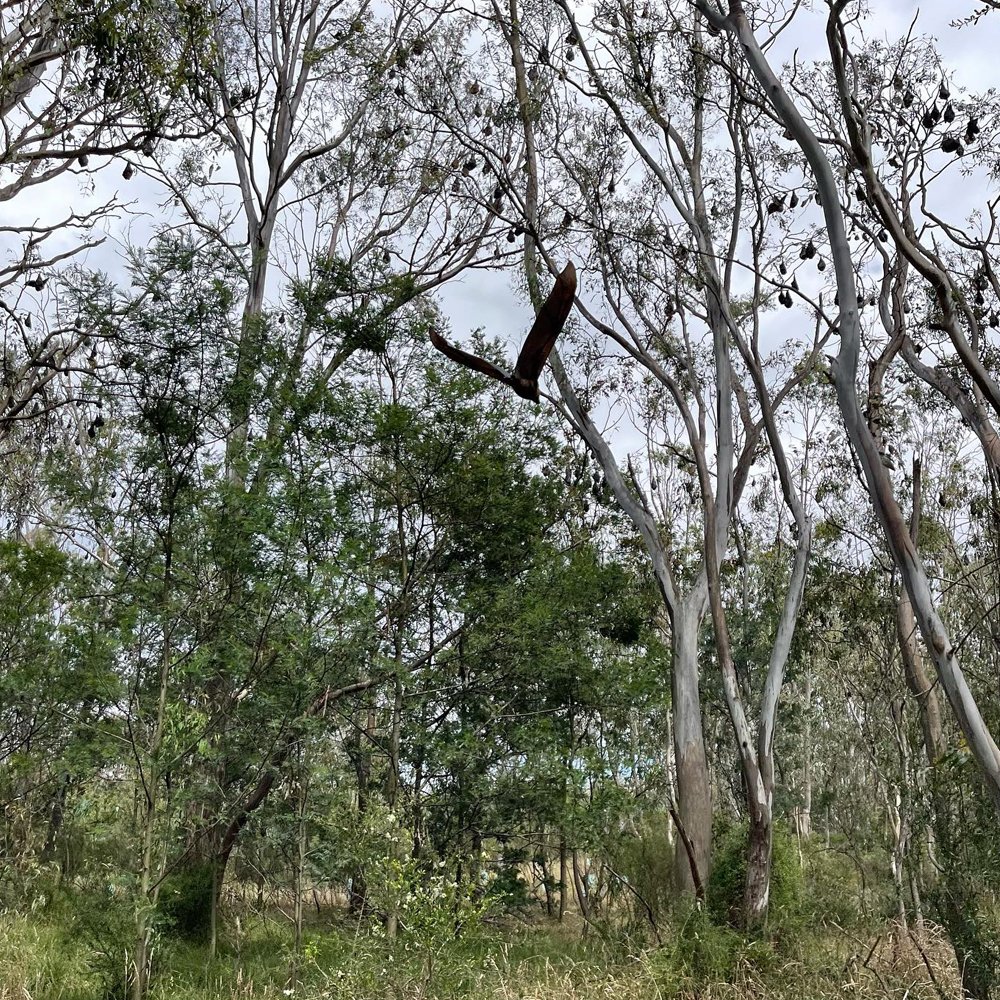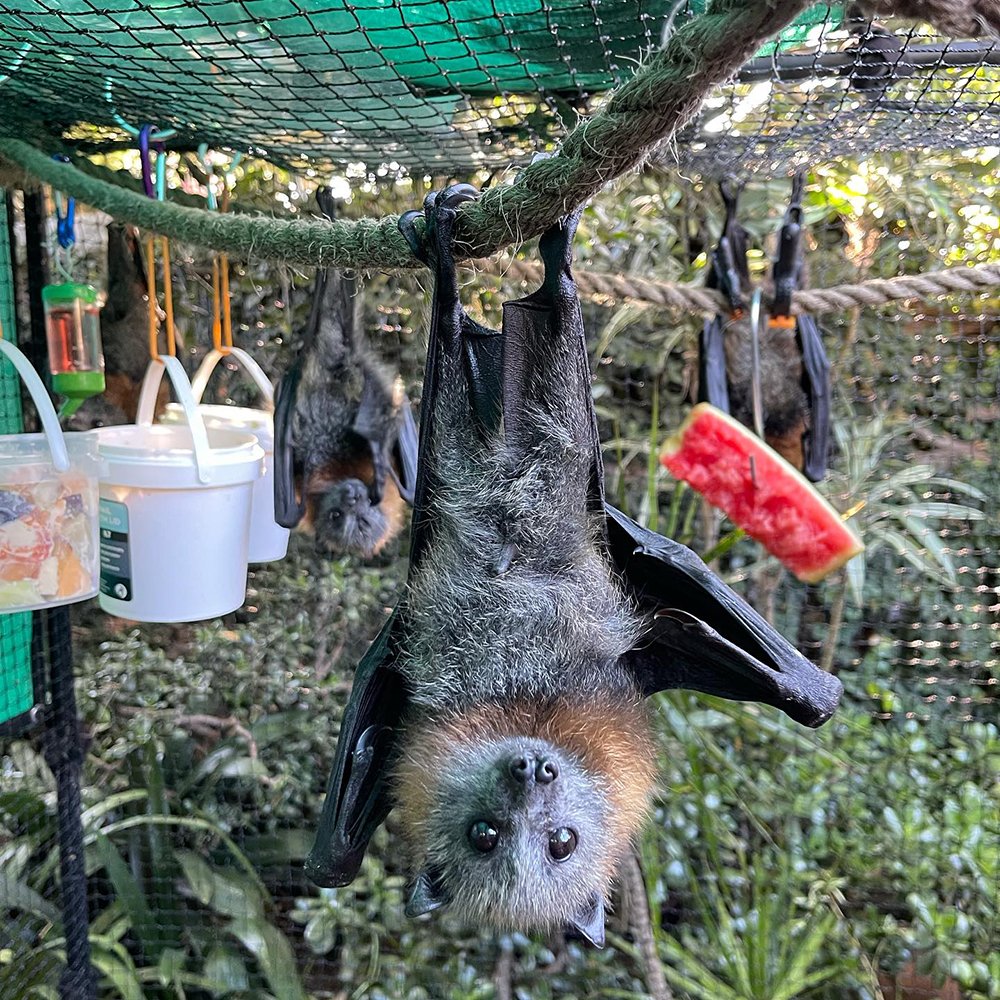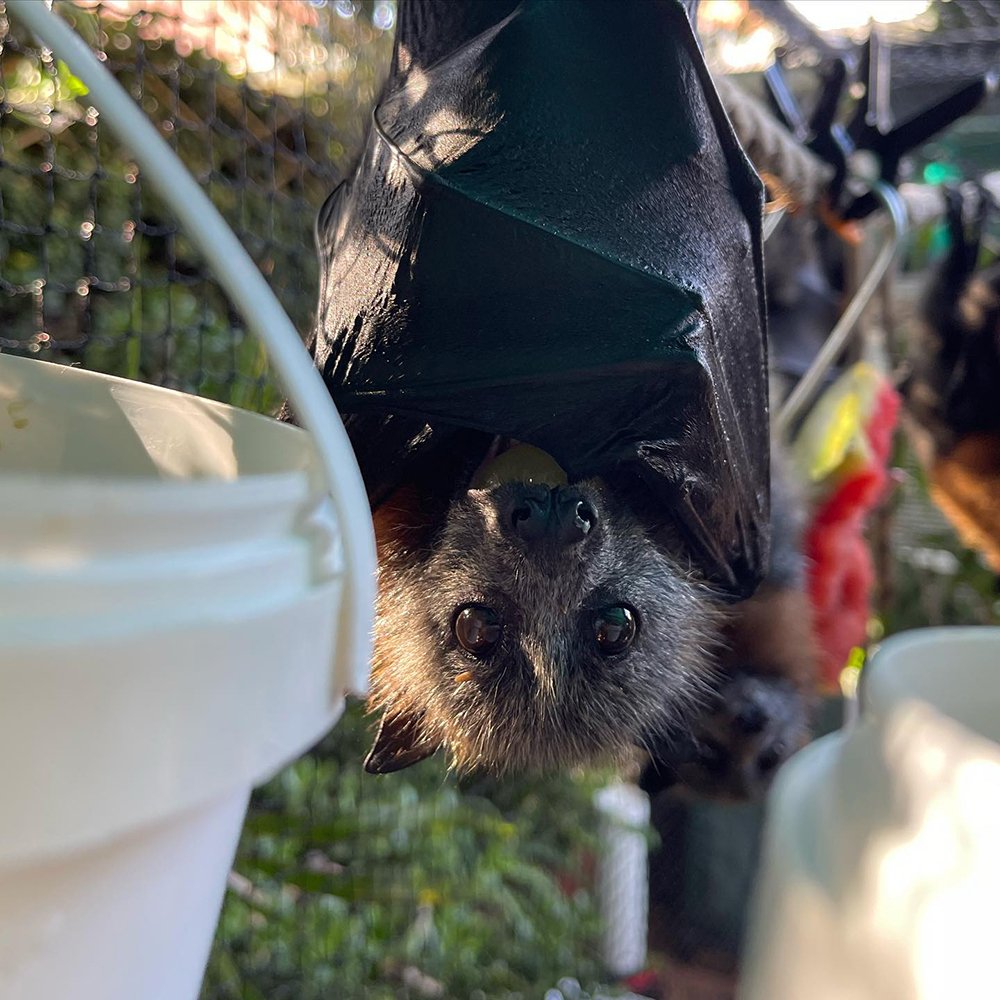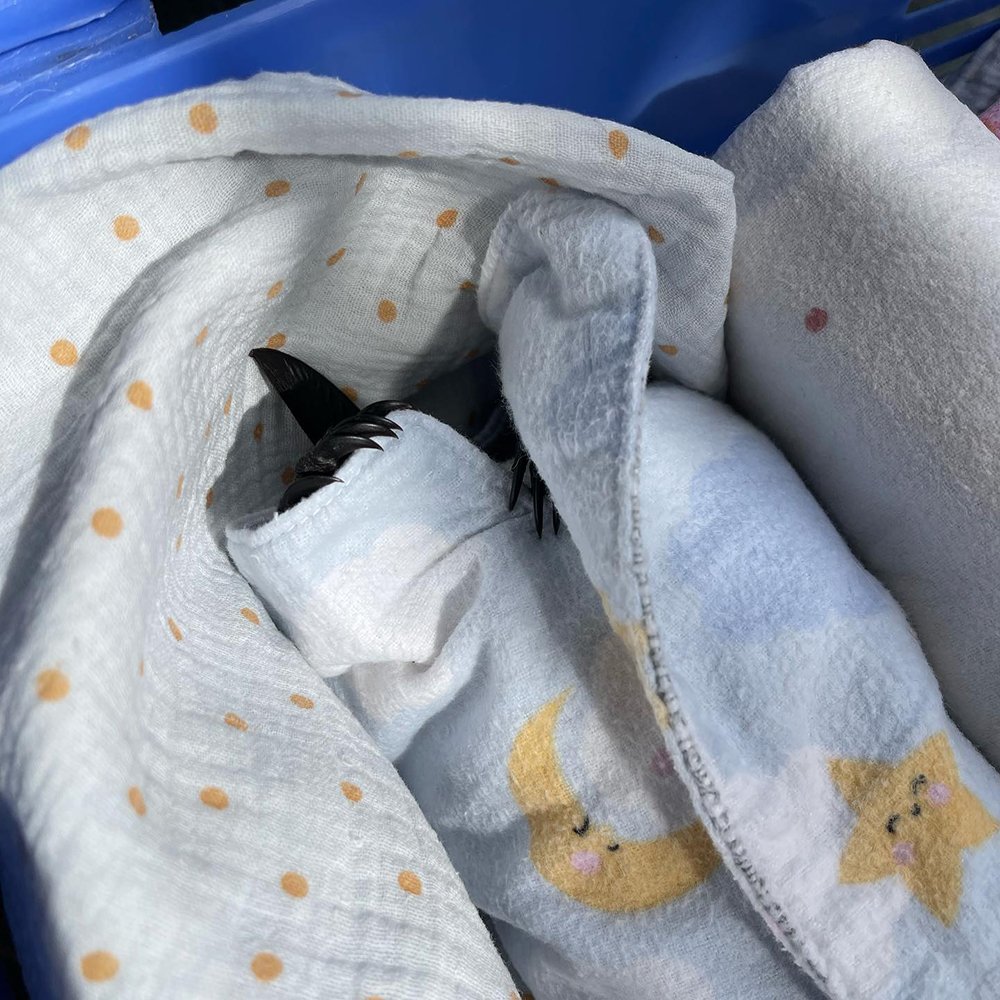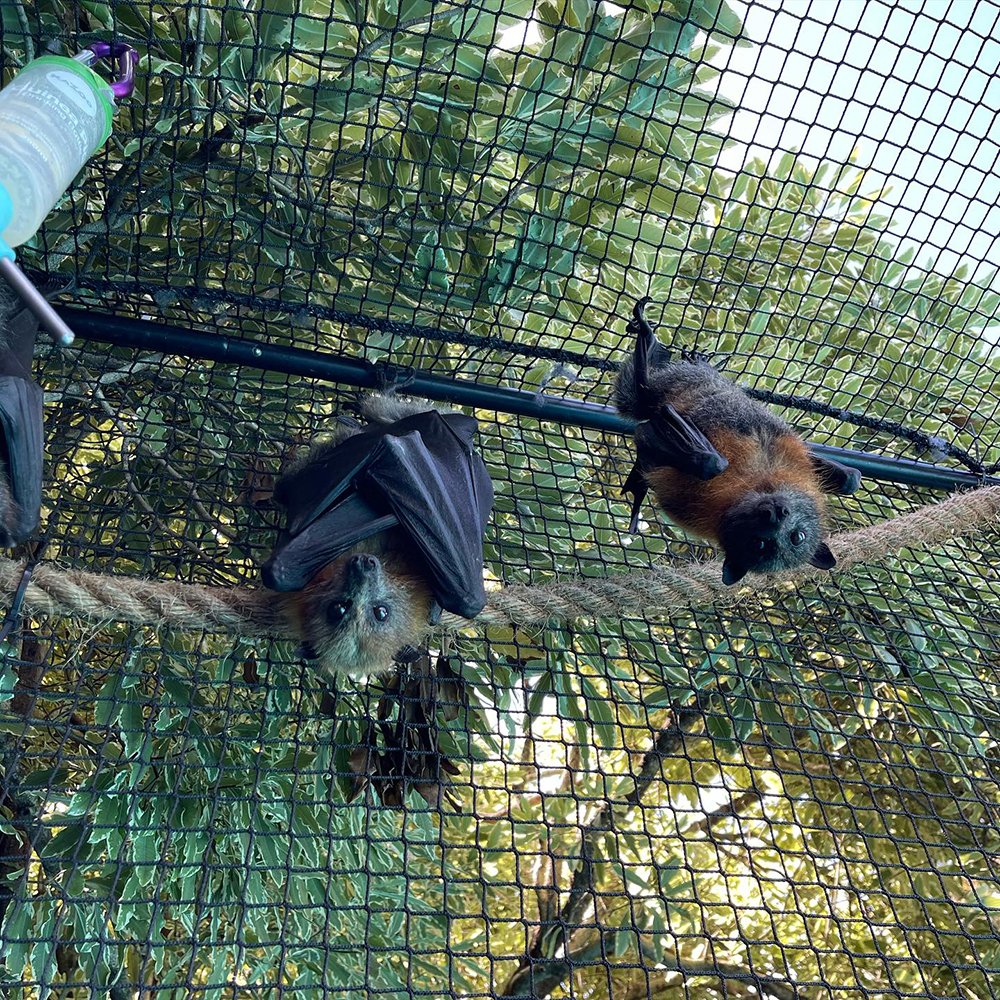Wildlings

Late January — Mid February, pollinators and pepper shakers
Grey-headed flying fox pup season 2023—24
From the bright mid morning light, in which they hang with grapes, like an extension of a bunch, to the low light of evening, that makes their chestnut mantles glow, there is a lovely energy in the outdoor enclosure. Recently, it was Otto, Marigold, and Bell’s turn to head to crèche at Bat Rescue Bayside, in our busiest season yet.
Otto came into care on the 8th of November, and though it seemed the rupture of the extensor tendon might hinder his chance of return to the wild, after physio and weeks of keeping it bandaged in the correct position, he was ready for the flight aviary.
Marigold came in on the 10th of December from the Yarra Bend colony, 10-days underweight, with an ulcer on her left eye. Sweet natured, she always checked in on all the pups in the cube, and liked to sniff in the ears of her peculiar upside down, wingless friends.
Finally, Bell, joined the trio and she came into care on the 23rd of December. She was 23-days underweight and very dehydrated, and we were not sure she’d make it. But she, too, was ready to earn her wings.
They were followed by Basil, Charlie, Kiko, Vera, and Quinn, but a hop later.
Come the tail of the weekend, the remaining pups we currently have in care will be headed to Bat Rescue Bayside’s crèche as well, and the full outdoor enclosure you see here will stand empty for a spell.
Under the watch of Allegra and Fina (two adults who were in care after being found entangled in illegal fruit tree netting, and who have since been released at the Yarra Bend colony) the enclosure this summer has been an inquisitiveness of glorious bats.
From a cloud of bats to a puddle of possums, turn around and step inside the neighbouring enclosure to see how healthy Ernestine, Hen, Beryl, and Bernice are looking. When the light is low and the plumbago fresh, see the cylindrical structure of their eyes, and imagine the feel of their plush and varied coats.
They still love to squeeze into the one nesting box, and when the lid is ajar, they make use of the lip. Come autumn it will be time for their soft release too. We will miss the sounds they make as the four of them nibble on a grevillea treat.
Try hard as you do, sadly, some injuries run too deep and not every pup that is rescued and comes into care makes it to the next stage (crèche and soft release).
Here’s to Piccolo, Maudie, Herb (all pictured below), and Clove, who floated to the tall gumtrees in the sky.
And all the ones whom we never drew up a chart* for, filling in a name for their time in close human company before their return home, because they died not long after their rescue or had already passed. So many young ones are flying out with the colony and landing in nearby areas, grounded in a tram depot, like the one at Kew Junction, or like Maudie, grounded in a Richmond courtyard, scrambling to secure her feet to a potted plant, and with injuries too great to recover from. They have headed out, weeks earlier than they normally would attempt, in search of food (nectar, pollen, fruit), and along the way, they’ve come undone.
Here’s to those who do make it. May they lead long wild lives. May they experience life as a cloud of bats in the sky, like the evocative collective noun. May their ringtail friends, also, as a passel of plush possums.
Sending a huge, heartfelt thank-you to Vonnie of Vonnie’s Wildlife Supplies in East Gippsland for donating flying fox bottle teats, both Latex and Silicone. And a huge heartfelt thank-you to Warriors 4 Wildlife for donating Tegaderm™ (transparent film dressing used for wing damage typically as a result of fruit netting), syringes, wipes, tissues, wool wash, and puppy pee pads (for the base of the indoor enclosure).
With thanks to Woolworths (Middle Brighton and Smith Street Metro, Fitzroy) for their Food Diversion program to help us with fruit supplies, and WIRES for a Disaster Relief eGift Card for fruit for pups and adults.
Such donations are greatly appreciated, extremely practical, and timely as we, and other flying fox carers and shelters, experience a busier season than the one prior, with hundreds of orphaned pups, across Victoria, coming into care, and rehabilitating adults (with netting injuries, for example. With less and less food sources available to them, due to ongoing habitat destruction, and rainy season washing away what nectar there is, many have become entangled in netting as they seek out fruiting trees as an alternative to their preferred native fruits and nectar. Those who do not need to be euthanised upon rescue, owing to the extent of their injuries, stay in care for several weeks, like Allegra and Fina did, to ensure there is no dieback to their wing membrane from constricted blood supply).
From fruit (red-skinned apples, pears, melons and so on) to newspapers and washing detergent, you might like to consider checking with your nearest wildlife shelter to see how you can best help support wildlife and carers. Why not check in with your nearest and see what they need.
* We record the outcome of all wildlife cases we respond to, however the ones who have died before or immediately after rescue do not have a care plan drawn up which lists the details of where they were found, charts their weight, records their injuries and outlays their treatment plan.
Please note: you need to be a qualified, vaccinated carer to handle bats.
Image credit: Tea Tree specimen in flower from Edward William Minchen’s Botanical sketches and drawings, 1893—1897, in the collection of State Library of NSW



